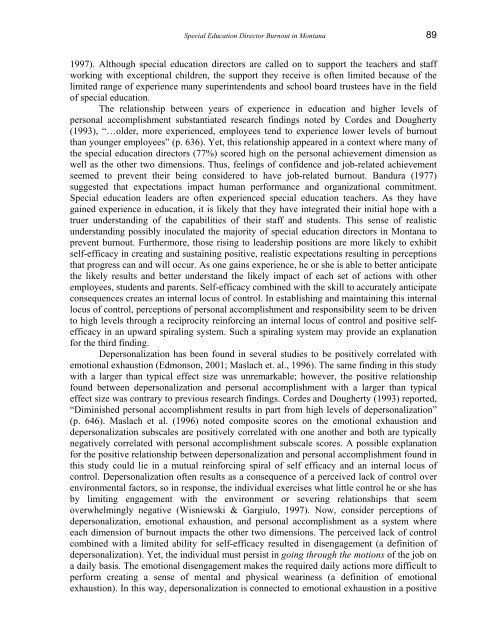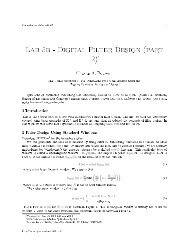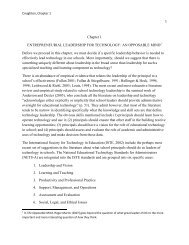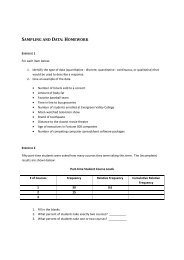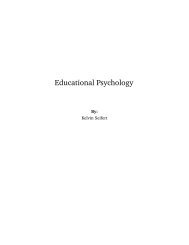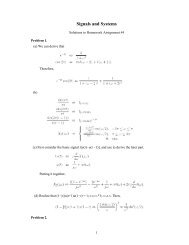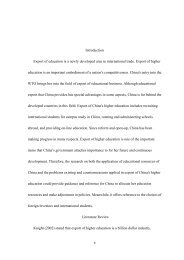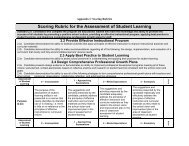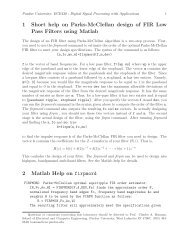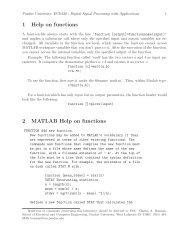Blazing New Trails - Connexions
Blazing New Trails - Connexions
Blazing New Trails - Connexions
You also want an ePaper? Increase the reach of your titles
YUMPU automatically turns print PDFs into web optimized ePapers that Google loves.
Special Education Director Burnout in Montana 89<br />
1997). Although special education directors are called on to support the teachers and staff<br />
working with exceptional children, the support they receive is often limited because of the<br />
limited range of experience many superintendents and school board trustees have in the field<br />
of special education.<br />
The relationship between years of experience in education and higher levels of<br />
personal accomplishment substantiated research findings noted by Cordes and Dougherty<br />
(1993), “…older, more experienced, employees tend to experience lower levels of burnout<br />
than younger employees” (p. 636). Yet, this relationship appeared in a context where many of<br />
the special education directors (77%) scored high on the personal achievement dimension as<br />
well as the other two dimensions. Thus, feelings of confidence and job-related achievement<br />
seemed to prevent their being considered to have job-related burnout. Bandura (1977)<br />
suggested that expectations impact human performance and organizational commitment.<br />
Special education leaders are often experienced special education teachers. As they have<br />
gained experience in education, it is likely that they have integrated their initial hope with a<br />
truer understanding of the capabilities of their staff and students. This sense of realistic<br />
understanding possibly inoculated the majority of special education directors in Montana to<br />
prevent burnout. Furthermore, those rising to leadership positions are more likely to exhibit<br />
self-efficacy in creating and sustaining positive, realistic expectations resulting in perceptions<br />
that progress can and will occur. As one gains experience, he or she is able to better anticipate<br />
the likely results and better understand the likely impact of each set of actions with other<br />
employees, students and parents. Self-efficacy combined with the skill to accurately anticipate<br />
consequences creates an internal locus of control. In establishing and maintaining this internal<br />
locus of control, perceptions of personal accomplishment and responsibility seem to be driven<br />
to high levels through a reciprocity reinforcing an internal locus of control and positive selfefficacy<br />
in an upward spiraling system. Such a spiraling system may provide an explanation<br />
for the third finding.<br />
Depersonalization has been found in several studies to be positively correlated with<br />
emotional exhaustion (Edmonson, 2001; Maslach et. al., 1996). The same finding in this study<br />
with a larger than typical effect size was unremarkable; however, the positive relationship<br />
found between depersonalization and personal accomplishment with a larger than typical<br />
effect size was contrary to previous research findings. Cordes and Dougherty (1993) reported,<br />
“Diminished personal accomplishment results in part from high levels of depersonalization”<br />
(p. 646). Maslach et al. (1996) noted composite scores on the emotional exhaustion and<br />
depersonalization subscales are positively correlated with one another and both are typically<br />
negatively correlated with personal accomplishment subscale scores. A possible explanation<br />
for the positive relationship between depersonalization and personal accomplishment found in<br />
this study could lie in a mutual reinforcing spiral of self efficacy and an internal locus of<br />
control. Depersonalization often results as a consequence of a perceived lack of control over<br />
environmental factors, so in response, the individual exercises what little control he or she has<br />
by limiting engagement with the environment or severing relationships that seem<br />
overwhelmingly negative (Wisniewski & Gargiulo, 1997). Now, consider perceptions of<br />
depersonalization, emotional exhaustion, and personal accomplishment as a system where<br />
each dimension of burnout impacts the other two dimensions. The perceived lack of control<br />
combined with a limited ability for self-efficacy resulted in disengagement (a definition of<br />
depersonalization). Yet, the individual must persist in going through the motions of the job on<br />
a daily basis. The emotional disengagement makes the required daily actions more difficult to<br />
perform creating a sense of mental and physical weariness (a definition of emotional<br />
exhaustion). In this way, depersonalization is connected to emotional exhaustion in a positive


